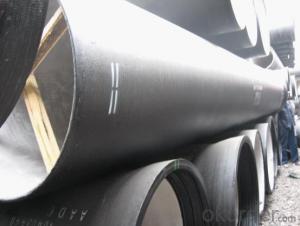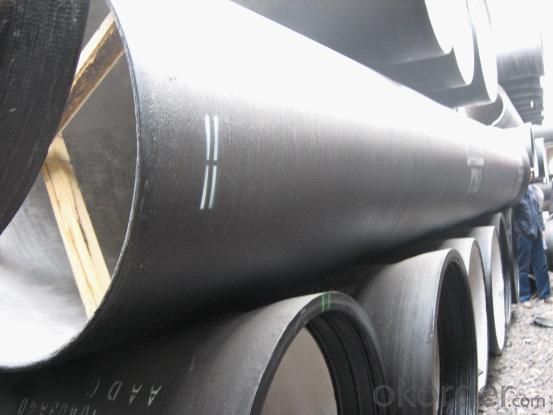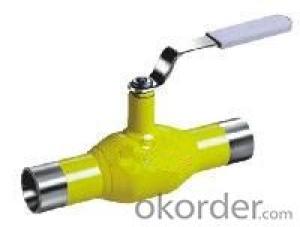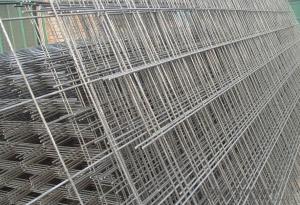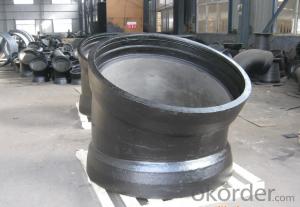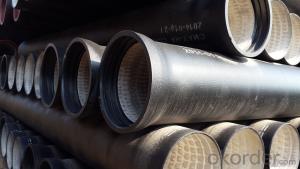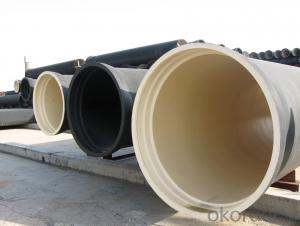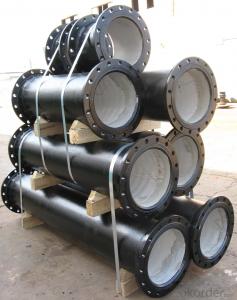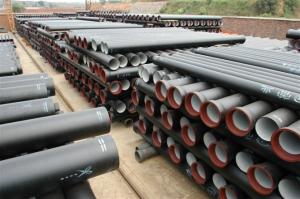T Type Ductile Iron Pipe DN1500
- Loading Port:
- China Main Port
- Payment Terms:
- TT OR LC
- Min Order Qty:
- -
- Supply Capability:
- -
OKorder Service Pledge
OKorder Financial Service
You Might Also Like
1) The standard of pipe: ISO2531:1998, EN545:2006,K9 K8
2) Effective length: 6m/5.7m
3) Inner cement line: Portland cement lineas per ISO4179
4) Zinc coating: at least 130g/m2 as per ISO8179
5) Bitumen painting: at least 70μm as per ISO8179
6)With 102% quantity of NBR, SBR, or EPDM ring asper ISO4633
7) DN80-DN1200
8) Highstrength, lighter than grey iron, good corrosion resistance, no furring, smallflow resistance, easy fixing, long life tome about 100 yeas
9)Checked by automatic inspection equipment
10) Composition:
Chemical composition | |||
Chemical composition | Ductile Cast Iron Pipe (%) | Grey iron pipe (%) | Steel pipe (%) |
C | 3.5-4.0 | 3.2-3.8 | 0.1-0.2 |
Si | 1.9-2.6 | 1.4-2.2 | 0.15-0.4 |
Mn | 0.15-0.45 | 0.4-0.6 | 0.3-0.6 |
P | ≤0.06 | ≤0.3 | 0.02-0.03 |
S | ≤0.02 | ≤0.1 | 0.02-0.03 |
Mg | 0.03-0.06 |
|
|
11) Feature:
Mechanical properties | |||
| Ductile Cast Iron Pipe | Grey Iron Pipe | Steel Pipe |
Tensile Strength(Mpa) | ≥420 | 150-260 | ≥400 |
Yield Strength(Mpa) | ≥300 | No Confirmation | No Confirmation |
Bending Strength(Mpa) | ≥590 | 200-360 | ≥400 |
Elongation (%) | ≥10 | Neglected | ≥18 |
Brinell Hardness(HBS) | ≤230 | ≤230 | About 140 |
12) T type mechanical joint
13) Packing: in bulk or container
PACKING: 1) Pipesare bundled together with the steel belt.
2) Wooden pieces are put between the pipes.
- Q: What material is the cutting tool for ductile iron?
- The tool manufacturers so much, such as: Santak, Kenna, widia, Dai Jie, Walter, MITSUBISHI, Toshiba, ISCA, TaeguTec, Zhuzhou, each of the grades are not the same. But according to your specific processing workpiece and processing time and precision requirements, can choose the most suitable tool.
- Q: Are ductile iron pipes prone to leakage?
- Ductile iron pipes are generally resistant to leakage due to their robust and durable nature. However, like any other infrastructure, they can be susceptible to leakage if they are not properly installed or maintained. Regular inspections, proper installation techniques, and timely repairs are essential to minimize the risk of leakage in ductile iron pipes.
- Q: What is the typical pressure rating of ductile iron pipes?
- The typical pressure rating of ductile iron pipes ranges from 150 to 350 PSI (pounds per square inch), depending on the diameter and class of the pipe.
- Q: Fire water supply network adopts ductile iron pipe, the test pressure should be no more than MPa
- To your selected fire pump highest lift 1.5 times to suppress, generally not more than 1.6MPa, if the use of ductile iron pipe, test pressure according to 2MPa to suppress.
- Q: What are the advantages of using ductile iron pipe over concrete pipe?
- There are several advantages of using ductile iron pipe over concrete pipe. Firstly, ductile iron pipe has a higher strength-to-weight ratio compared to concrete pipe. This means that it can withstand higher pressure and loads while being lighter in weight. This makes it easier to handle and install, reducing labor costs and time. Secondly, ductile iron pipe has superior corrosion resistance compared to concrete pipe. It is less likely to rust or degrade over time, which increases its lifespan and decreases the need for frequent repairs or replacements. This makes it a more cost-effective option in the long run. Additionally, ductile iron pipe has better flexibility and resilience compared to concrete pipe. It can withstand ground movement, settling, and other environmental factors without cracking or breaking. This makes it more durable and less prone to damage, reducing maintenance and repair costs. Moreover, ductile iron pipe has a smoother interior surface compared to concrete pipe. This results in improved flow characteristics and reduced friction, allowing for more efficient transportation of fluids. It also minimizes the risk of clogs or blockages, ensuring uninterrupted flow. Furthermore, ductile iron pipe is highly versatile and can be used in a wide range of applications. It is suitable for both above-ground and underground installations, making it ideal for various infrastructure projects such as water supply systems, wastewater treatment plants, and industrial applications. Overall, the advantages of using ductile iron pipe over concrete pipe include its higher strength-to-weight ratio, superior corrosion resistance, better flexibility and resilience, smoother interior surface, and versatility. These benefits make it a reliable and cost-effective choice for various infrastructure projects.
- Q: How are ductile iron pipes repaired in case of damage?
- Ductile iron pipes are typically repaired through various methods such as spot repair, joint repair, or full replacement. Spot repair involves fixing small sections of the pipe by cutting out the damaged area and replacing it with a new piece. Joint repair focuses on repairing the joints between pipe sections by replacing gaskets or applying sealants. In cases of extensive damage, full pipe replacement may be necessary to ensure the integrity and longevity of the pipeline system.
- Q: What is the typical diameter range of ductile iron pipes?
- The typical diameter range of ductile iron pipes is between 4 inches and 64 inches.
- Q: How can the connection of ductile iron pipe elbow be convenient for connecting?
- Ductile cast iron pipe in the groove pipe connection technology is also called the lathedog connection technology, has become the most liquid and gas pipeline connection technology, although this technology is later than foreign in domestic development time, but because of its advanced technology, domestic market quickly received. Since 1998, it has been developed and applied in just a few years. It has gradually replaced two traditional ways of pipe connection, such as flange and welding. Not only technically more mature, the market is generally recognized, but also by the national laws and regulations actively guide the policy. The application of grooved pipe connection technology makes the complex pipe connection procedure simple, fast and convenient. Took a big step forward in pipeline connection technology.
- Q: Can ductile iron pipes be used for underground mining applications?
- Yes, ductile iron pipes can be used for underground mining applications. Ductile iron is a strong and durable material that can withstand the harsh conditions and heavy loads associated with mining operations. It has excellent resistance to corrosion and is able to handle high pressure and temperature environments. Additionally, ductile iron pipes are flexible and can be easily installed and maintained, making them suitable for underground mining applications where mobility and adaptability are important. Overall, ductile iron pipes are a reliable and cost-effective choice for underground mining operations.
- Q: How much pressure can the ductile iron pipe socket meet?
- If it is a general installation, you can rest assured, are within the scope of tolerance.
Send your message to us
T Type Ductile Iron Pipe DN1500
- Loading Port:
- China Main Port
- Payment Terms:
- TT OR LC
- Min Order Qty:
- -
- Supply Capability:
- -
OKorder Service Pledge
OKorder Financial Service
Similar products
Hot products
Hot Searches
Related keywords
